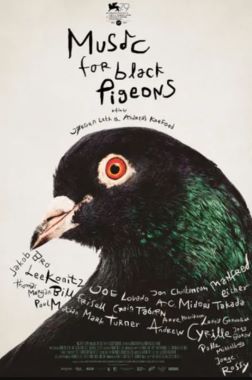DEFINING MUSIC IS TOUGH TO PIGEONHOLE
Music For Black Pigeons is a 90-minute documentary film by Jørgen Leth and Andreas Koefoed without a specific plot. Viewers get to see a variety of jazz greats during candid scenes that often take place at recording sessions dating from the past 20 years. There are some heartwarming moments and bits of humor along with a few insightful moments. A few of the key musicians are asked what is it about playing jazz that most touches them and what are they looking for in the music. Some give articulate responses while others try in vain to come up with answers.
Andrew Cyrille
Altoist Lee Konitz (1927-2020) emerges as the main star and is seen several times during the documentary. 87 years old at the time of some of the footage, he is seen at his apartment practicing and complaining how he is sounding even though he actually sounds typically great. He greets guitarist Bill Frisell and talks with Danish guitarist-composer Jakob Bro prior to a recording session and another date has him joking a bit with drummer Paul Motian. When he is asked about his horn, he reveals that it was his first horn and that his parents bought it for him in 1945 for $150. He is also seen in his apartment summing up his life and telling a humorous story that reveals what “Music For Black Pigeons” means.
Bill Frisell
Mark Turner and Jakob Bro
There is a fair amount of music throughout the documentary although none of the performances are complete. The music is consistently thoughtful and generally introspective, the type of performances that the ECM label has often released. In fact, ECM and founder Manfred Eicher is among those interviewed.
Joe Lovano
Along the way one hears from Bro, Frisell, bassists Thomas Morgan and Larry Grenadier, tenor-saxophonists Joe Lovano and Mark Turner, drummers Paul Motian, Jon Christensen, Jorge Rossy, and Andrew Cyrille (his scenes are a bit touching), trumpeters Palle Mikkelborg and Arve Henriksen, and percussionist-vibraphonist Midori Takada. Among the other highlights are Turner improvising on an unaccompanied tenor solo (he says that when playing he is looking for home, a center, and discovery), Frisell saying that each day when he picks up the guitar he feels he is starting from scratch, Mikkelborg commenting that when he plays it is a search for a meaning in life, Lovano talking about how he is inspired when he collaborates with veteran players, and Eicher making suggestions during a recording and remembering the late trumpeter Tomasz Stanko.
Thomas Morgan
Palle Mikkelborg
In addition to the lack of a specific plot, Music For Black Pigeons would have benefitted from a bit more music and some tighter editing from Adam Nielsen. Thomas Morgan’s attempts to answer some questions include such long pauses that it slows down the film. No historical information is supplied about the major players, with the filmmakers apparently taking it for granted that viewers know about everyone’s earlier accomplishments. And one did not really need to see Lee Konitz in a taxi trying in vain to remember the name of a music store that he wished to visit.
But Music For Black Pigeons has enough bright moments to satisfy jazz fans, and it is a rare treat to see these greats in action.
Thomas Morgan
Music For Black Pigeons
Ãnorâk Film and the Danish Film Institute
92 minutes | color | In English, Danish & Japanese | 2022
streaming on Amazon, Apple TV and more, July 2, 2024

